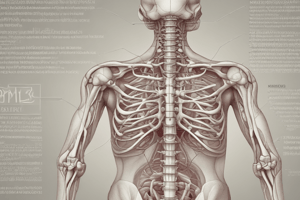Podcast
Questions and Answers
What is the primary benefit of nurses mastering medical terminology?
What is the primary benefit of nurses mastering medical terminology?
- Improving patient communication and education (correct)
- Understanding complex surgical procedures
- Enhancing collaboration with the healthcare team
- Ensuring accurate administration of medications
Why is it essential for nurses to be knowledgeable about pharmacokinetics?
Why is it essential for nurses to be knowledgeable about pharmacokinetics?
- To identify common patient care procedures
- To assess patients' health conditions accurately
- To understand how medications are metabolized in the body (correct)
- To perform advanced surgical interventions
In patient care, what role do nurses play in managing chronic conditions?
In patient care, what role do nurses play in managing chronic conditions?
- Conducting complex surgical procedures
- Collaborating with the healthcare team for treatment plans (correct)
- Providing emotional support and education to patients
- Performing routine laboratory tests
How can nurses ensure they provide optimal patient care in terms of pharmacology?
How can nurses ensure they provide optimal patient care in terms of pharmacology?
What foundational components are essential for nurses to deliver high-quality care?
What foundational components are essential for nurses to deliver high-quality care?
What is the primary purpose of understanding drug classes for nurses?
What is the primary purpose of understanding drug classes for nurses?
In medical terminology, what is the function of root words and prefixes?
In medical terminology, what is the function of root words and prefixes?
Which term describes a medical condition caused by healthcare providers or their actions?
Which term describes a medical condition caused by healthcare providers or their actions?
What is the significance of understanding pathophysiology for nurses?
What is the significance of understanding pathophysiology for nurses?
Why are eponyms important in medical terminology?
Why are eponyms important in medical terminology?
Study Notes
Nursing: A Comprehensive Overview
As a vital component of the healthcare system, nursing encompasses a diverse range of skills, knowledge, and ethical principles. In this article, we'll explore the subtopics of nursing ethics, health assessment, medical terminology, pharmacology, and patient care.
Nursing Ethics
Nursing ethics is grounded in moral principles and professional standards that guide nurses in their daily practice, focusing on respect for patients' autonomy, benefits vs. harms, justice, and patient advocacy. Key concepts include informed consent, patient confidentiality, and respect for patient dignity. Nurses must uphold the Code of Ethics for Nurses and the American Nurses Association's (ANA) Social Policy Statement, which outline ethical standards and professional responsibilities.
Health Assessment
Health assessment is the systematic and comprehensive evaluation of a patient's physical, emotional, and social well-being, including data collection, analysis, and diagnosis. Nurses assess patients using various tools, such as the health history, physical examination, and diagnostic tests. This information guides the creation of a nursing diagnosis, a problem-focused statement that addresses the patient's specific health needs.
Medical Terminology
Nurses must be adept at communicating with healthcare professionals, patients, and families using medical terminology. By mastering this vocabulary, nurses can more effectively coordinate care, provide accurate information, and advocate for patients. Learning medical terminology allows nurses to understand patient diagnoses, treatments, and medications, ensuring they can administer care more effectively and safely.
Pharmacology
Pharmacology is the science of drugs and their effects on the human body. Nurses must be knowledgeable about the properties, indications, contraindications, and side effects of medications to provide optimal patient care. They are responsible for administering prescribed medications, monitoring their effects, and reporting any adverse reactions. Nurses must also understand pharmacokinetics, pharmacodynamics, and pharmacogenomics to provide care tailored to individual patients, accounting for differences in drug response based on genetic factors.
Patient Care
Nurses provide patient care in a variety of settings, including hospitals, long-term care facilities, home care, and community clinics. Patient care involves promoting health, preventing illness, and managing chronic conditions through the application of evidence-based practices, collaboration with the interprofessional team, and patient involvement in their own care. Nurses must be adept at providing emotional support, advocacy, and education to patients and families, fostering a strong trust-based relationship.
In summary, nursing is a dynamic profession that requires a strong foundation in ethics, health assessment, medical terminology, pharmacology, and patient care. By understanding these core components, nurses are better equipped to provide high-quality, compassionate, and evidence-based care to patients, their families, and communities.
Studying That Suits You
Use AI to generate personalized quizzes and flashcards to suit your learning preferences.
Description
Explore key subtopics in nursing such as nursing ethics, health assessment, medical terminology, pharmacology, and patient care. Test your knowledge on the foundational components of nursing practice and prepare to deliver high-quality and compassionate care to patients.




